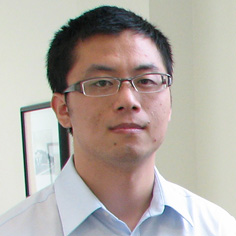
Chemistry Alumnus Huifeng Qian Wins 2013 IUPAC Prize for Young Chemists
By Amy Pavlak
The International Union of Pure and Applied Chemistry (IUPAC) awarded chemistry alumnus Huifeng Qian (S’12) and four others the 2013 IUPAC Prizes for Young Chemists. The prestigious prize recognizes the best Ph.D. theses in the chemical sciences as described in 1000-word essays. Qian’s thesis work focused on the synthesis and total structure determination of atomically precise gold nanoparticles. He is currently a J. Evans Attwell-Welch Postdoctoral Fellow in the Department of Chemical and Biomolecular Engineering at Rice University in Houston, TX.
“Huifeng was extremely productive in his four years of thesis research, and he did a superb Ph.D. thesis. He’s very deserving of this award,” said Rongchao Jin, associate professor of chemistry and Qian’s research advisor. “Huifeng’s ingenious work on controlling gold nanoparticles with atomic precision is expected to significantly advance the fundamental science of precious metal nanoparticles.”
During his graduate work at Carnegie Mellon, Qian developed methods for producing well-defined gold nanoparticles. Qian’s process allowed him to precisely control the number of atoms in each gold nanoparticle, resulting in uniformly-sized nanoparticles instead of the mixture of sizes typically created during nanoparticle preparation. Because the nanoparticles were of uniform size and shape, Qian grew them into high-quality crystals, and the structure was revealed by single crystal X-ray crystallography. Well-defined gold nanoparticles, which have unique structural, optical and electronic properties that vary with the number of gold atoms in the particle, hold great promise in many applications including catalysis, optics, and sensing.
The five IUPAC Prize winners will each receive$1,000 and travel expenses to the 44th IUPAC World Chemistry Congress in Istanbul, Turkey. They also will be invited to present a poster at the IUPAC Congress describing their award-winning work and to submit a short critical review on aspects of their research topics to be published in Pure and Applied Chemistry. The awards will be presented during the Opening Ceremony of the Congress.
IUPAC was formed in 1919 by chemists from industry and academia. For almost nine decades, the Union has succeeded in fostering worldwide communications in the chemical sciences and in uniting academic, industrial and public sector chemistry in a common language. More information about IUPAC and its activities is available at www.iupac.org.
Originally published: https://www.cmu.edu/mcs/news-events/2013/0624-Qian-IUPAC_Prize.html